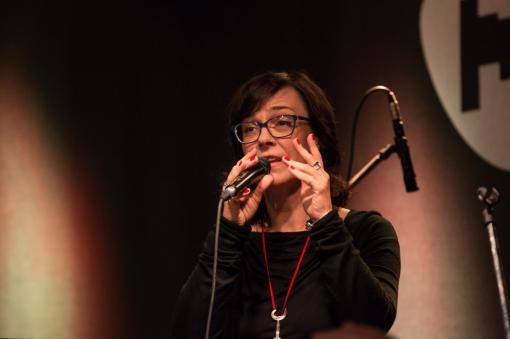The Brno singer and artist Dáša Ubrová has sung with a group, performs with a big-band and is close to chanson, jazz and rock. Her album, named simply after her, is important to her and not only because it is her solo debut. It is the first time she has written all the lyrics herself. The music is mainly created by her “court co-workers” and album producers, the pianist Vojtěch Svatoš and the guitarist Pavel Šmíd.
Both of the composers and musicians work, like Uhrová, in more than one genre (Pavel Šmíd for example has long been interested in African music). The production, including the experienced Milan Cimfe from the Sono studio, did not stop at one musical face. If we say that the album is close to modern pop music, we mean truly good quality pop, which aspires to include the whole musical spectrum ranging through jazz, chanson and Latin American music to folk, blues or rock, without seeming over-combined or chaotic. The album isn’t colourful in the sense of every song being of a different genre - rather a symbolic rainbow of styles runs through the individual songs. For example, to try and describe songs like Prostor a čas (“Time and Space) or Kronika (“Chronicle”), were we to generalise, we would need to say way more than three genres.
The core of the band consists of Šmíd, Svatoš and the brothers Bořek (bass) and Jakub (keyboards) Tvrzník. This is complemented with three alternating drummers, a wind section, a string section and special guests (Emil Kopřiva played the guitar in his own composition while the sound engineer Cimfe played the percussion and more importantly added his vocals to the song). Even though all the musicians never meet in a single song, we can call it a small orchestra due to the truly rich and yet still readable arrangements.
It is the styling of the songs into quality pop music with an emphasis on the colours of the wind instruments, keys and guitars that takes our attention away from the lyrics. Dáša Ubrová did conceive of the album as a collection of personal testimonies, but her debut seems at first sight to be a well-written album, prepared for the singer by the producers and authors. I emphasise “singer”, not “songwriter” (in the sense of an author’s testimony). This conception is supported by the lyrics themselves. Even though we can feel the hints of an epic straight from the first composition Krok k cíli (“A step towards the finish”), Dáša’s strong voice, supported by the rhythm and the melodic instruments, emphasises rather the slogans: “Cíli jsou blíž” (“Close to the finish”); “Kostky jsou vrženy / cos čekal od ženy” (“The die is cast / what did you expect from a woman”); “Sám v prachu kráčí” (“He walks alone in the dust”). The text as a coherent narration gets lost behind a wall of rich arrangements, which is of course not wrong in this genre. Words rather fill in what we take in from the music itself. The soundtrack stays in the head even when it includes words that are impossible to decipher without the booklet. A typical example is Kapka deště (“Raindrop”), one of the most distinctive songs on the album, with the chorus: “Má tvarů k mání, / bere i chrání / rozbřeskem – nocí / je blahem, je mocí.” (“Has shapes to offer / takes but protects / dawn – dusk / is bliss, is power.”)
Alongside Kapky deště, the seven-minute, slowly gradating duet of Dáša Ubrová and Milan Cimfe Zůstávám tebou (“I keep being you”) is one of the strongest moments. The song Prostor a čas is also interestingly built with the introduction “Tanči a krok svůj si s lehkostí hlídej” (“Dance but lightly watch your step”), which then continues to actually dance. The verses “Barev a odstínů máš náruč plnou” (“Your arms are full of colours and shades”) refers to not only the colourfulness of the album, but also to the singer’s other hobby, the fine arts. All throughout the work, light, glow, flames, moonlight, shadow and the white of day are expressions that keep reappearing, both in the topic of human relationships (usually in the form of him and her), or in more abstract topics. Even the themes of Dáša Ubrová’s lyrics are pop. The singer does not look for original topics, like for example her favourite, Zuzana Navarová, to whom she is likened (not very fittingly) by some. The songs on the album deal with everyday things in a language that doesn’t have to be poetic at all costs, sometimes even slightly over-combined, adding another shade to the already colourful music. It is this combination of light and shadow transferred into music that says more about the author in the end than long stories and detailed descriptions of individual compositions.
Dáša Ubrová; Indies Happy Trails 2017, 11 songs, total time 50:18
































No comment added yet..